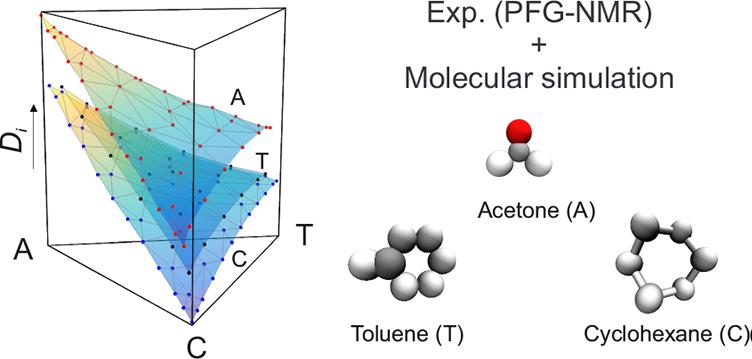Pulsed-field Gradient (PFG) NMR Service
Nuclear magnetic resonance (NMR) is one of the most commonly used analytical methods to determine molecular structures. With the development of NMR technology, the pulsed-field gradient (PFC) NMR technique has become an important tool for measuring the self-diffusion coefficient of liquid and solution samples because of its rapid and non-destructive nature, low sample usage, and low influence by impurities.
PFC allows the establishment of a clear mathematical relationship between the molecular diffusion motion and the field gradient intensity. The main role of field gradient is to perform spatial localization, including phase encoding and frequency encoding, which can be used to clarify any position in space by field gradient. The radiofrequency (RF) pulse is mainly used for transmitting and collecting signals, and the echo signal is used to understand the characteristics of the sample.
 Figure 1. Measurement of self-diffusion coefficients in mixtures by 1H NMR spectroscopy using PFG. (Daniel, B.; et al. 2020)
Figure 1. Measurement of self-diffusion coefficients in mixtures by 1H NMR spectroscopy using PFG. (Daniel, B.; et al. 2020)
Creative Biostructure provides PFC NMR technology service to extend the capability of NMR spectroscopy to analyze complex mixtures. We can virtually separate each chemical entity in a multi-component system by measuring the self-diffusion coefficient of the mixture. While the self-diffusion coefficient reflects the effective size and shape of the molecules, PFC NMR can provide specific information on molecular size, molecular weight, intermolecular interactions, and aggregation states. This allows our customers to identify mixture components, measure molecular size, molecular weight distribution, and characterize intermolecular forces.
Advantages of Our Technology
- Solvent-free selectivity and high sample recovery
- No need for concentration gradients or labeling of diffusing materials
- Ability to track molecular assemblies along diffusion paths
- Enables analysis of co-mingled systems
Applications
- Size measurement of molecules, e.g., nanoparticles.
- Compositional analysis of complex mixtures. Identification of the components of the various matrices in drugs, dietary supplements, foods, beverages, and biological extracts based on the diffusion speed of different molecules.
- Interaction studies between molecules in solution and biological systems; evaluation of the association constants between the subject and object molecules.
- Measurement of molecular weights, such as analyzing molecular weight distribution in polymers.
The setting of the experimental parameters has a large influence on the test results. Therefore, depending on the degree of match between the study object and the pulse program, our scientists select the appropriate signal acquisition and processing program for different types of samples. We are happy to generate a tailored proposal to meet the different research needs of the customers in the fields of chemistry, pharmacy, food, biology, etc. Please feel free to contact us for any analytical needs and you will get a satisfactory answer.
Ordering Process
Reference
- Bellaire D.; et al. PFG-NMR and MD simulation study of self-diffusion coefficients of binary and ternary mixtures containing cyclohexane, ethanol, acetone, and toluene. Journal of Chemical & Engineering Data. 2020, 65(2): 793-803.
